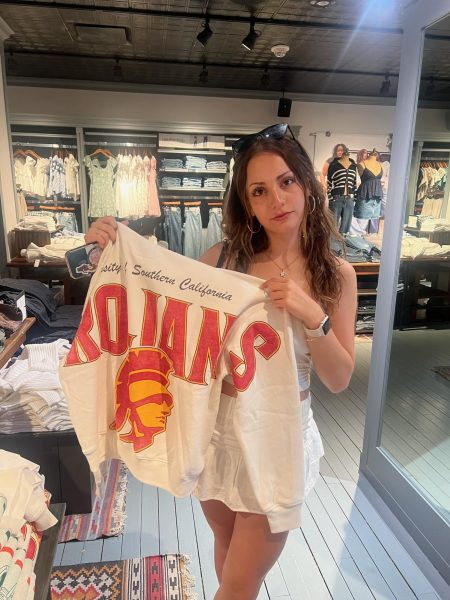Unlike other video production programs offered in PPS, Franklin’s is more unique and long-term, designed for those who plan to pursue filmmaking as a career. It is also known as Franklin Film School. This is a four-year film program, where students who are interested in pursuing video production as a career can learn the fundamental skills needed to make a film, including pre-production, directing, cinematography, field recording, acting, editing, and production organization as well as management.
Starting with Beginning and Intermediate Video Production, students are taught the fundamentals of filmmaking and are prepared for the advanced classes, Narrative and Documentary Filmmaking. Beginning Video Production, or 1-2, is the introductory class, where students delve into the art of storytelling, completing many group projects and learning to use the equipment safely and correctly. Intermediate, or 3-4, is when things get a little more serious and more freedom is given. Students are now able to check out equipment to film outside of school, and there is more emphasis on editing, deadlines, and independence. Finally, Narrative and Documentary Filmmaking are the final two classes offered in the program. Each involve semester-long projects around the creation of short films that are eventually shown at screenings for the community to watch.
The video production program has been up and running for about 15 years, but Franklin Film School has only been around for 10 years; after Adam Souza joined Javier Perez, they created and founded it together. Perez started at Franklin as an art teacher, and after his first year of teaching, he suggested they begin a video production course that he would be happy to teach. At the same time, Souza was working at Franklin as an I.T. person and found himself in the video production classroom frequently. After befriending Perez, and finding a passion for teaching, Souza returned to school to get his teaching license. Following Souza’s return, what had only been Video Production 1-2 and 3-4 had transformed with the addition of a new class specifically for directing. This eventually led to the creation of Franklin Film School, which established a new creative community within the school.
“We used to have only three levels of video production and students would either exit after Directing, which was the third level, or they would take Directing again.” Souza continues, “It just made more sense to give students the opportunity to have a full year of Documentary and a full year of Narrative.”
Perez left Franklin in spring of 2022, wanting to continue pursuing his freelance film career. Seth Denlinger was the next teacher to join the Film School, his first year being the 2022-2023 school year. The year before, he was spending most of his time substitute teaching. “During that time, I took a sub job called ‘Video Production.’ I think Mr. Perez, who created the program, walked in when I was talking about copyright law in documentary law. It was a total accident, I got very lucky,” says Denlinger. Although Denlinger’s first year at Franklin had its challenges, the 2023-2024 school year has gone nicely thus far. “This year is going great and I’m loving the work, the energy, the passion, the vibe, and the creativity,” he says.
As a program intended for those interested in pursuing a career in filmmaking, many students have found their passion and even possibly their college major in the Film School. When talking with Souza, although he loves teaching film, what he really loves is to teach his students how to successfully collaborate with others. “Early in the year, we talk about what it means to be vulnerable and how that is deeply connected to creativity. Filmmaking is a team sport.” Denlinger completely agrees, saying, “I love seeing people work together and struggle and solve problems, and sometimes I get to hold a boom pole or get cast in a bit part.”
Students of all ages are dispersed throughout the program, with some people who have taken the classes from freshman to senior year, like Sophia Beffert, a Franklin senior. Beffert had not forecasted for video production during her freshman or sophomore year and had no interest in film growing up, but after two years in the program, she was hooked. “Every year I get better, which isn’t saying a lot because I started off pretty bad, but watching the projects I make improve over time is very fulfilling.”
Sydney Smith, a Franklin junior and student in Intermediate Video Production, had “heard about the program at Franklin through a graduate friend who had one of their films showcased at a national film event.” Smith decided to join the program in hopes of gaining more skills in the field of film production, and she did. “You’re learning useful, career-applicable skills while just getting time to be creative and meet new people.” She intends to continue the course next year, adding, “I do enjoy filming and photography in my free time, and this program has helped me to improve the quality of my work.”
Another Film School student, Braden Bechtel, a freshman in Beginning, has enjoyed his first semester in the program. Although he was put into video production by accident, he plans to continue in the program for the foreseeable future. “Mr. [Delinger] has really opened my eyes to a lot of things about film that I hadn’t bothered to notice before, and I’m interested in taking film as a career in the future.”
As the first semester of this school year is coming to a close, so are the first semester narrative and documentary short films, with two screenings: Narrative’s screening on Jan. 25 and Documentary’s on Feb. 2. This film festival allows the students in Franklin Film School to share their work with an audience. “It’s like a celebration of all of the hard work you do, and it’s cool to see peers’ work as well,” Tallulah Hutchinson, a senior and four-year film school student, says. Look around Franklin and notice the many posters for other students’ films, and come watch them in the auditorium at 6 pm on the listed dates!
Franklin Film School is a special and unique program that has a positive impact on our school’s community. When asked why he wanted to teach this subject, Souza says, “Film making gives power to my students. It’s a different language of communication that they are learning. I am teaching them how to make audiences feel things as they tell stories that are important to them.”


































